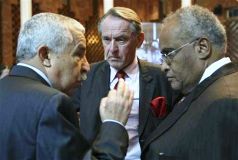Darfur talks postponed to allow further rebel preparation
October 28, 2007 (SIRTE, Libya) — Crippled by the absence of key rebel leaders, a highly anticipated Darfur peace conference was effectively postponed Sunday to give rebel delegates time to prepare before direct negotiations with the Sudanese government.
 The U.N. and African Union peace mediators described a multiphase process of talks involving an initial “consultation” period ahead of “substantial negotiations” set to open in a few weeks.
The U.N. and African Union peace mediators described a multiphase process of talks involving an initial “consultation” period ahead of “substantial negotiations” set to open in a few weeks.
“The process leading to negotiations has begun,” said Salim Ahmed Salim, the AU envoy. The mediators stated the consultation phase would start Monday, and Salim said “the actual date when the negotiations will begin” would be determined later.
The peace conference, which opened Saturday, had widely been expected to see direct negotiations between rebels and government forces to resolve over four years of fighting that has claimed more than 200,000 lives in the western Sudanese region.
But none of Darfur’s rebel main leadership was in the Libyan coastal town of Sirte for the start of the talks, dashing hopes that an agreement could rapidly be reached.
“The real substantial negotiations will start when the parties are prepared,” U.N. mediator Jan Eliasson said to reporters. He told The Associated Press he expected this to begin in about three weeks.
Opening the talks Saturday, Libyan leader Moammar Gadhafi noted that both key rival leaders, Abdulwahid Elnur and Khalil Ibrahim, were absent. “These are major movements, and without them we cannot achieve peace,” he said.
During the coming weeks, several significant rebel groups who are now boycotting the talks could chose to join, mediators said, saying Ibrahim’s Justice and Equality Movement could be one of them.
The mediators declined to say the conference was being adjourned, insisting instead that the preliminary low-level talks were a necessary build-up for full-fledged negotiations.
“I refuse to state that the peace process is interrupted. The train has left on the road to peace … the question is how many passengers will come on,” Eliasson said.
Mediators stated they would remain in Libya, but said envoys from their teams could be sent to Darfur or elsewhere to press rebel leaders to attend.
Sudan’s government negotiator warned earlier Sunday that Khartoum would have no patience for absent rebels. Nafie Ali Nafie said negotiations could be adjourned only to allow “those who came here” to have more time to reach a common ground.
“To adjourn negotiations for those who didn’t come is a wrong signal,” Nafie told reporters. “It’s unacceptable.”
The special envoy from China, which has considerable leverage on Sudan’s government, said postponing would allow more constructive peace talks later. “The adjournment is not a sign of failure. It’s a preparation of other steps,” Liu Guijin said.
But Nafie insisted the handful of low-level rebels attending “really represented the movements on the ground in Darfur,” and called on the United Nations to impose sanctions on the boycotting factions.
The main rebel leaders say the groups in Sirte are government stooges aimed at weakening the rebellion.
The rebels present in Sirte said they would “look into the possibility” of matching the unilateral cease-fire announced by the Sudanese government at the opening of the talks.
But the boycotting movements said Khartoum’s announcement was “propaganda.”
“How can we discuss a cease-fire when they bombed us within hours of their announcement?” said Abdelazziz Ushar, a top JEM military commander. Speaking by satellite phone from Darfur, he claimed the Sudanese air force had bombed a rebel zone in the Jebel Moon area late Saturday and another North Darfur area on Sunday.
Al-Nur, the founder of the rival Sudan Liberation Army, also told the Al-Jazeera International news channel that the bombings took place and described the government’s pledge of a cease-fire as “incongruous.”
Gen. Martin Agwai, who heads the 7,000-strong African Union force currently in Darfur, said the alleged bombardments would be investigated. “I’m not confirming or denying it took place: I’m saying we’ve received no reports for now,” Agwai told AP.
Dozens of cease-fires have been announced and then breached by Khartoum or the rebels since 2003, when ethnic African fighters rose up against the Arab-dominated central government, accusing it of discrimination.
Salim, the AU chief envoy, said there was no guarantee a peace agreement would be reached by the time a joint force of 26,000 U.N. and AU peacekeepers is due to deploy in January.
In London, British Prime Minister Gordon Brown lauded Khartoum for its new cease-fire pledge. “But of course if parties do not come to the cease-fire then there is the possibility that we will impose further sanctions on the government of Sudan,” Brown said.
(AP)
